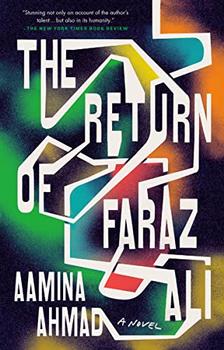Summary | Excerpt | Reading Guide | Reviews | Beyond the Book | Readalikes | Genres & Themes | Author Bio

A Novel
by Aamina Ahmad
That was when they slammed into him. He fell forward, bodies on top of his. But these boys were light. Their thin arms circled his waist, his chest; they clambered on him like children in play. He shook them off and they landed on their backs. There were two of them. One scrambled to his feet and ran. The other boy lay there, breath gone. His eyes were closed-he was playing dead-but Faraz pulled him up and the boy opened his eyes. Faraz didn't think about how fragile the bones in a face are, how he might feel them with the pads of his fingertips if he pressed hard. He thought instead about how he didn't want to be here, that he must get back to Ichra, to the safety of its empty streets. He yanked the boy closer and brought his fist down on the boy's face, again and again. There was relief in the way the boy's face opened up to him, its contours, its ridges caving in so easily, as if he wanted nothing more than this, as if he were being freed. The boy gasped, heaved, before slumping from Faraz's arms to the ground.
Then, the sound of a cry. Behind him, a girl in a doorway was squatting on the floor, a baby in her arms. She shushed the baby, squeezed him to her chest. Faraz took a step toward her, to tell her to get inside, get back where it was safe, but he couldn't speak. He was all breath. She didn't move. He lifted up the boy and dragged him to the doorway. He sat on the steps and held him. He gestured to the girl to go. She disappeared for a moment but then came back down the stairs with a cloth and handed it to him. He held the rag to the boy's broken face and then leaned down over him, his ear to the boy's mouth, listening for a sound.
Two
It was after midnight when Faraz returned to the station with his men, the van loaded with a handful of rioters whom his men continued to beat in the holding cell. They didn't need to, because the boys were afraid and compliant, but as Inspector Karim, his old station house officer, used to say: Best to let them get it out of their systems, and, besides, with all the desk work the sisterfuckers need the exercise. At three a.m., when he felt the boys could take no more, he told his men that was enough and most of them left the station, their bodies still thrumming, to find something to bring them down-a smoke, a fuck, anything. But he didn't leave. He walked the courtyard listening to the boys in the cell whimper and call for their mothers. Shh, he thought as he paced, shh. He looked down at his hands; it hurt to make a fist.
He lay down on the sagging charpoy in his office, a portrait of President Ayub Khan in his field marshal's dress uniform above him, the line of gleaming medals across his chest almost as dazzling as his smile. Was the president smiling now? Had they done a good enough job of shutting these boys up with their whining about freedom and elections and the price of flour? He thought of unmoving clouds of tear gas, smashed faces, his thuggery - he turned to his side.
He'd just fallen asleep when the phone woke him. He should have ignored it, but that was impossible; as always, its ring induced panic; he might be needed; it could be Mussarat, something might be wrong with the baby, or perhaps someone was looking for him-not for an inspector, but for him. Though it was never any of those things.
Still groggy, it took him a moment to recognize Wajid's voice, which was gravelly, as if he, too, had just woken up. "Are you all right?" Wajid asked. Faraz, disoriented, nodded instead of speaking. "Faraz?" Wajid said again.
"Yes, I'm fine. Are you?" It had been at least six months since they had spoken. Wajid had called to say he'd heard that Faraz was now living in Lahore, that he would come to see the baby. Faraz had not expected to hear from him again and he hadn't until now, but truthfully he had been disappointed; the baby was Wajid's first grandchild, and he had hoped it might mean something to him even though really he knew better.
Excerpted from The Return of Faraz Ali by Aamina Ahmad. Copyright © 2022 by Aamina Ahmad. All rights reserved. No part of this excerpt may be reproduced or reprinted without permission in writing from the publisher.
At times, our own light goes out, and is rekindled by a spark from another person.
Click Here to find out who said this, as well as discovering other famous literary quotes!
Your guide toexceptional books
BookBrowse seeks out and recommends the best in contemporary fiction and nonfiction—books that not only engage and entertain but also deepen our understanding of ourselves and the world around us.